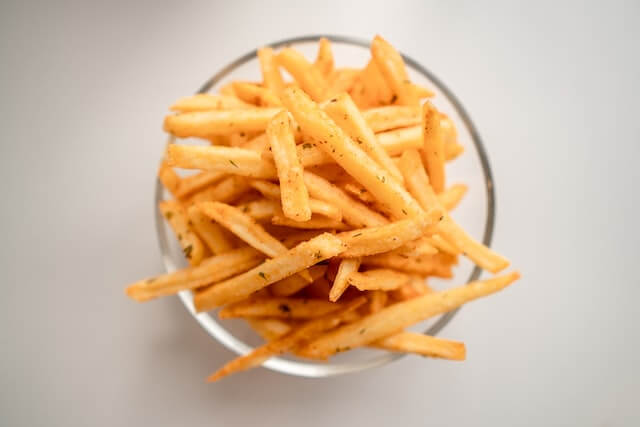Your Christmas Dinner in numbers
Tis the season to eat a lot of yummy food, so Wise has teamed up with the food-and-culture expert and Chef, Mallika Basu as part of our Christmas Without...

Oh, hello. You’ve decided to read one of my articles, I’m flattered blush. My name’s Anna and I work at Wise as a Content Marketing Manager. While you feast on these yummy facts please bear in mind that all views, giggles and niggles come from me, not Wise. So if you have any qualms or questions, get in touch. Happy reading.
A lot of people who use Wise are children of the world, cultural cocktails, border hopping beauties. You get the gist.
They embrace a myriad of cultures, have accents you can\’t quite pinpoint and collect passports like Pokemon cards. I happen to be someone who has an accent you can’t quite pin down. Is she English? Is she an Aussie/Irish hybrid? Is she faking it? You’ll never know.
So in honour of all my fellow foreign friends I decided to take a look at some of the world's favourite dishes. But hang on, there’s a twist….
Here are some foods you know and love that aren’t from where you would’ve thought…
Now, if you’ve spent any time in the UK at all, you’ll know that Percy Pigs are a pretty big deal. A staple of many of our childhoods that have seeped into adulthood too. These pink little piggys can be purchased in sweetie bags across the country in Marks and Spencers.
And they’re not just any sweetie, they’re a bloomin 'delicious sweetie.
Anyway, turns out these guys aren’t from Ol Blighty at all, they are in fact GERMAN. Ja, ja you read that correctly.
Percy Pigs are actually produced by a company called Katjas, and over in Deutschland they’re called Fred Ferkel.
Ok this one is just pure false advertising, because German Chocolate Cake? Not so German. Not so German at all.
If you aren’t familiar with the cake, it’s a chocolate cake frosted with coconut and chopped up pecans. Well, as it turns out, the cake was created by a British-born man living in America. His name was Samuel German and he made the cake while working for the Massachusetts Baker’s Chocolate Company. It was then published in the Dallas Morning News and the rest was yummy history.
For some reason, something like Ketchup just has American written all over it. But in actual fact, Ketchup found its feet in China/Vietnam.
The sauce was originally made from fermented anchovies, and was discovered by Chinese sailors when they were exploring the Mekong coast. The sailors gave it the name “ke-tchup” which is ancient Hokkien. The “tchup” translates to “sauce.”
When British traders came to China in the 17th century they came across the sauce and from there it became the delicious dipping wonder we put on things we probably shouldn’t.
You know them, you love them, you definitely have no “I’m full” radar while eating them.
These salty, scrumptious sticks obviously sound like they’re from France. Well, their exact origin isn’t totally known. But many historians believe that they come from the 1600s Spanish Netherlands, which is now known as Belgium.
Locals of the region would typically fry fish for dinner, but when Winter came about and the lake became ice skating worthy, they would fry potatoes instead.
During World War I, American soldiers in Belgium were introduced to the potatoey goodness and gave them the name “French Fries.” Anyway, nowadays Belgium, France and the Netherlands are all renowned for their fries, so this would explain it.
Not Indian, but Scottish. You read that right lads and lassies. It’s not all haggis and tatties up North. The dish was supposedly created in 1970’s Glasgow when a chef added the sauce to chicken tikka pieces.
There is debate around where it comes from, some say it was invented in India, others say it was first made in other parts of the UK. But today, it’s declared a national dish of the UK, winning the title in 2001.
Vindaloo originated in Portugal and during the 15th century, Portuguese explorers bought the dish to India with them.
Their version of the dish is called “Carne de vinha d'alhos” and is still eaten in Portugal today. It consists of wine-vinegar and garlic marinated meat, and is consumed alongside potatoes.
In India, fragrant spices like cardamom and cinnamon to the dish with an obligatory chilli kick.
My motto is “if it’s fried, I’ll eat it” and Tempura is no exception to this rule.
The history on this one isn’t set in stone, there is discussion as to where its from. But apparently the word “Tempura” derives from the Portuguese word “Temporas” which means Lent. And during Lent when their Christian population couldn’t consume meat, they’d eat fried green beans instead. It’s said that Portuguese explorers then brought this concept to Japan in the 1500’s.
Before you freak out, let me preface this by saying that Croissants as we know them ARE French.
Now breathe and prepare for a tale of baked goods history.
Croissants are actually based on Austria’s “Kipferl” pastry which was created to celebrate the winning of the Battle of Vienna in 1683. The battle was won over the Ottomans which is why the pastry is shaped like a crescent moon, symbolising the moon on the Ottomon flag. That way the Viennises could beat the Ottomans all over again by biting into the pastry.
The pastry was then either introduced to France by Marie Antoinette or baker August Zang who opened a Viennese bakery in Paris during the 1800’s.
Hungry yet? If you’re looking to book a flight to one of the lovely locations mentioned above, get yourself a Wise account so you can save pennies on fees and spend them on some of these yummies instead.
Please see Terms of Use for your region or visit Wise Fees & Pricing for the most up to date pricing and fee information.
*Please see terms of use and product availability for your region or visit Wise fees and pricing for the most up to date pricing and fee information.
This publication is provided for general information purposes and does not constitute legal, tax or other professional advice from Wise Payments Limited or its subsidiaries and its affiliates, and it is not intended as a substitute for obtaining advice from a financial advisor or any other professional.
We make no representations, warranties or guarantees, whether expressed or implied, that the content in the publication is accurate, complete or up to date.

Tis the season to eat a lot of yummy food, so Wise has teamed up with the food-and-culture expert and Chef, Mallika Basu as part of our Christmas Without...

Millions of people around the world travel over Christmas, Hanukkah and Kwanzaa. In 2022 alone, 77,000 flights took off on Christmas Day globally. That may...

Salt-N-Pepa the iconic hip hop group = ❤️ love Salt and pepper, AKA the only seasoning I used as a university student = 🥲sigh Taking the Spice Girls advice...

The festive season is upon us, and it’s pretty much the same deal every year: Shop for gifts last minute Eat like a Sumo wrestler in training Travel to see...

We've teamed up with personal finance expert, Kia Commodore to help give your money a kick up the backside so you can go ahead and sleep. “Lazy Money” is what...

We've teamed up with personal finance expert, Kia Commodore to help give your money a kick up the backside so you can go ahead and sleep. “Lazy Money”...